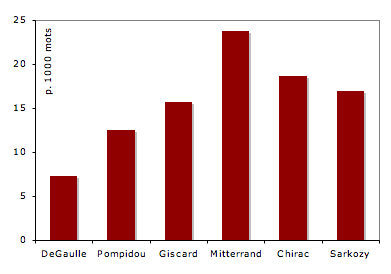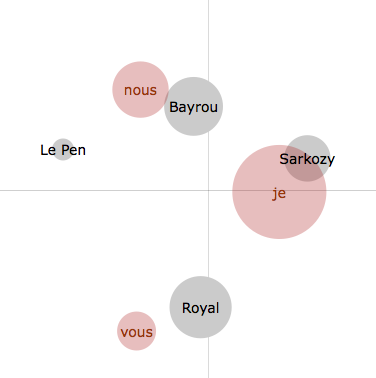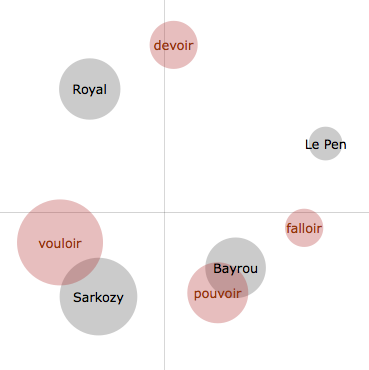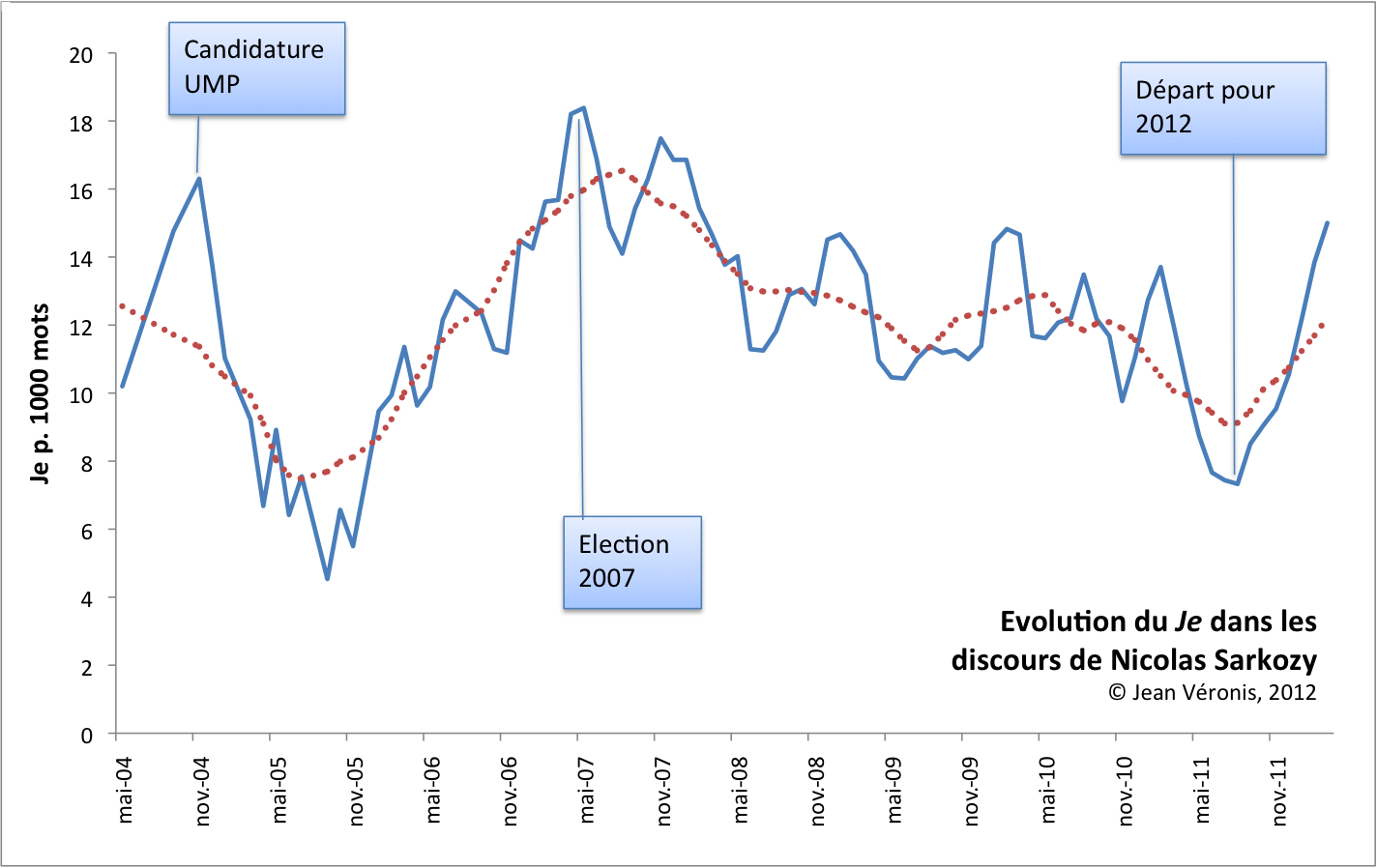French political egology
« previous post | next post »
Jean Véronis ("Sarkozy: Je revient", Le Monde 3/23/2012) traces the rate of je usage in 728 speeches by Nicolas Sarkozy, delivered over a period of nearly six years:
(French je is the first-person singular pronoun as used in subject position, approximately comparable to English I).
Sarkozy's variable use of je (between roughly 0.4% and 1.8%) exhibits long-term trends that plausibly track the political calendar.
This is part of an Observatoire des Discours ("Discourse Observatory") that Jean has helped to set up at Le Monde. He notes that
Les mots nous disent décidément bien des choses. Ils parlent volontiers malgré nous. Surtout ceux qu'on ne surveille pas, comme les pronoms et autres « petits mots » du discours… Nos observatoires sont là [2007, Sarkozy, 2012] pour vous aider à jouer avec eux !
Words tell us many things. They willingly speak even against our wishes. Especially those that we don't monitor, such as pronouns and other "little words"… Our observatories are there [2007, Sarkozy, 2012] to help you play with them!
Jean has been doing this sort of thing for a while, and some of his earlier work suggests that overall, Sarkozy tends to use je less than some other politicians at the same level ("Sarko : Moi, je (1)", Technologies du Langage 10/2/2007):

Jean offers some visualizations that are a bit more sophisticated than simple word-counting — for example, he uses factor analysis to illustrate graphically the relationships intrinsic in a table whose rows are words and whose columns are politicians, with the i,j-th cell giving the number of times that word i was used by politician j.
Here's the plot for certain pronouns and politicians from the 2007 French presidential campaign ("Sarko : Moi, je (2)", Technologies du Langage 10/3/2007):

He explains that
En gros (en très gros…), plus les bulles sont grandes plus l'élément est fréquent ; plus elles sont proches, plus les éléments sont similaires.
Roughly (very roughly), bigger circles mean that an element is more frequent; closer circles mean that the elements are more similar.
Here's the plot for certain modal verbs from the same campaign ("Sarko : Moi, je (3)", Technologies du Langage 10/5/2007):

I don't know of anyone who's now doing anything similar for the current American political scene — at best we get word clouds.

Coby Lubliner said,
March 31, 2012 @ 3:24 pm
I thought it was a spelling error (revient for reviens) until I noticed that Je was italicized.
marie-lucie said,
March 31, 2012 @ 4:44 pm
Coby:
Yes, this is a pun dependent on spelling, because the pronunciation of the 1st and 3rd person are identical (they were different in Old French, but not any more).
Je reviens: I am coming back
Je revient: "I" is coming back. It would be more idiomatice, and unambiguous, to say Le "je" revient, but then there would be no pun.
myl:
Observatoire des Discours : Speeches Observatory
Discourse Observatory : Observatoire du Discours
John said,
April 1, 2012 @ 6:12 am
There are data issues with the first chart, no? What degree of smoothing to use, and how many data points there are. For example, if you fit it to a straight line, it would be mainly 04/05 that is wildly out of whack.
The data seem monthly.
I think there's an annual increase around/after November.
Bill W said,
April 2, 2012 @ 11:04 am
Did Jean Véronis do the kind of analysis that Jamie Pennebaker to distinguish between various uses of the first person pronoun — including distinguishing between the "graceful" and the "sledgehammer" uses?
http://languagelog.ldc.upenn.edu/nll/?p=1651
I don't see any evidence of it in the linked pages. And, while personally I don't want to intrude into French politics, I had the uncomfortable feeling that Véronis was perhaps trying to score the same sort of cheap political points as Will, Noonan and Fish, albeit with statistics that I'm not sure really prove anything. Even if it's correct that Sarkozy tends to use the FPP more abundantly in the heat of political campaigns, what does that tell us?
Adrien Barbaresi said,
April 7, 2012 @ 11:32 am
I work on a similar approach regarding German politicians : I made a German Political Speeches Corpus and Visualization available (http://purl.org/corpus/german-speeches), where is it possible to visualize how often a given word was used (the results may be ordered by year or by speaker).
Here is a direct link to an example showing how (relatively) often the 5 last German presidents used the word "ich" (I) in their official speeches : http://perso.ens-lyon.fr/adrien.barbaresi/corpora/BP/ich-rel.html#section=name